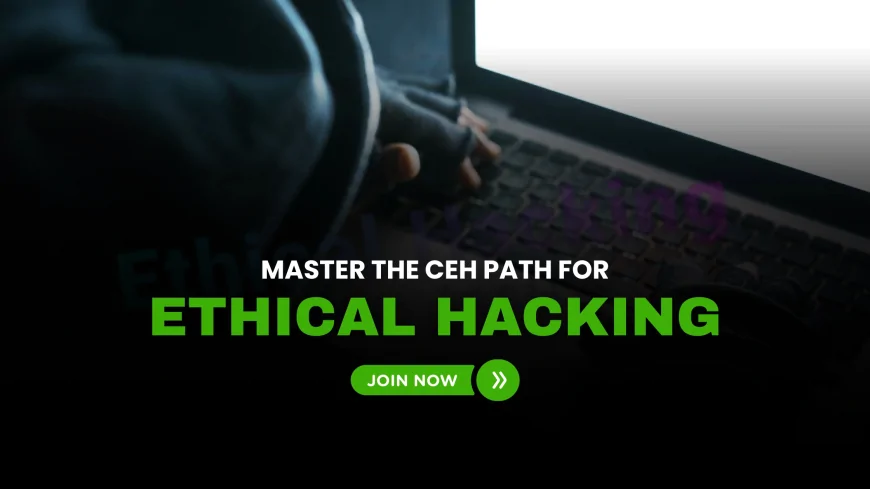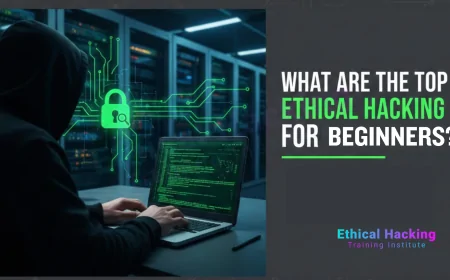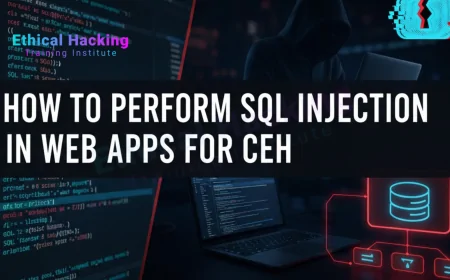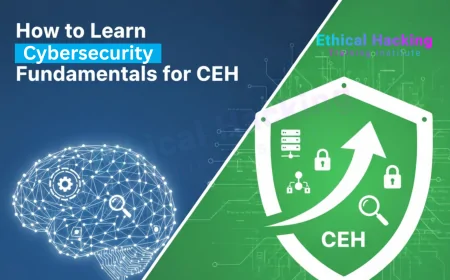Becoming a CEH Certified Ethical Hacker: A Guide to Career Success | Master the CEH Path: Build a Future-Proof Career in Cybersecurity
Learn how to become a Certified Ethical Hacker (CEH) with our complete guide. Explore training paths, skills, tools, certifications, career opportunities, and exam strategies.

Table of Contents
- Introduction
- Why Choose CEH?
- Prerequisites & Preparation
- Training Options & Formats
- Core Skills You’ll Master
- Tools & Virtual Labs
- Exam Preparation Strategy
- Certification & Renewal Process
- Career Paths & Roles
- Salary & Job Outlook
- Advancing Beyond CEH
- Soft Skills & Professional Habits
- Common Challenges & Solutions
- FAQs
- Conclusion
Introduction
Master the CEH Path: Build a Future-Proof Career in Cybersecurity. CEH certification, offered by the EC-Council, demonstrates your ability to think like an adversary to protect organizations effectively. This guide explores the journey—from foundational skills and training options to exam success and career progression.
Why Choose CEH?
The CEH certification offers:
- Industry Recognition: Accreditations by ANSI and global employers.
- Security Mindset: Teaches hacking methods for defense.
- Broad Applicability: Relevant across industries and roles.
- Career Acceleration: Qualifies you for roles like Ethical Hacker or Penetration Tester.
- Learning Foundation: Lays groundwork for advanced certifications.
Prerequisites & Preparation
Start with:
- Fundamental networking (TCP/IP, DNS, routing)
- Basic operating system knowledge (Windows/Linux)
- Introductory scripting (Python/Bash)
- Security awareness and ethical mindset
Optional preparatory steps include CompTIA Network+ or Security+, Linux practice, and basic coding exercises.
Training Options & Formats
- Self-Paced Online: Videos, quizzes, labs on-demand.
- Instructor-Led Virtual: Scheduled live classes with Q&A.
- Bootcamps: Intensive in-person or remote learning.
- Hybrid Learning: Combines live classes and recorded content.
Core Skills You’ll Master
- Reconnaissance & OSINT gathering
- Network scanning and enumeration
- System exploits and patch assessments
- Web application vulnerabilities (SQLi, XSS, CSRF)
- Wireless & mobile security testing
- Malware analysis and reverse engineering
- Penetration test methodology and reporting
Tools & Virtual Labs
CEH gives access to essential tools:
- Learn to use Nmap for reconnaissance, Metasploit for exploiting vulnerabilities, Burp Suite for web app security, and Wireshark for packet capture.
Labs (e.g. EC-Council iLabs) simulate real-world environments for experiential learning.
Exam Preparation Strategy
- Create a study schedule breaking out modules with lab practice
- Complete quizzes and mock exams aligned with the CEH blueprint
- Engage actively in labs, reports, and capstone simulations
- Use community forums for doubt clearing and teamwork
- Revise exam objectives and take final practice tests
Certification & Renewal Process
Becoming a Certified Ethical Hacker (CEH) involves more than just passing an exam—it's about maintaining your credibility and staying up-to-date in the ever-evolving world of cybersecurity. Below is a complete overview of how to get CEH certified and how to renew it.
Step-by-Step CEH Certification Process
1. Meet Eligibility Criteria
- You can qualify in two ways:
-
-
Attend Official Training via EC-Council or an authorized partner (no prior experience required).
-
Self-Study + Application: You need 2+ years of information security experience and must submit an eligibility form ($100 USD fee).
-
- Choose Your Training Format
-
Options include:
-
Instructor-led classroom or online
-
Self-paced EC-Council iLearn
-
CEH Bootcamps
-
-
-
Complete the CEH Training
-
Typically 40 hours of structured content covering 20 modules.
-
Includes practical labs and real-world scenarios.
-
-
Register for the CEH Exam
-
After training or approval via eligibility form, you'll receive an EC-Council exam voucher.
-
Exam cost: ~$1,199 USD (may vary based on region & package).
-
Register via ECC Exam Portal or Pearson VUE.
-
-
Take the CEH Exam
-
Format: 125 Multiple Choice Questions (MCQs)
-
Duration: 4 hours
-
Passing Score: CEH candidates must score between 60% and 85% to pass, depending on the form of the exam administered.
-
-
Receive CEH Certification
-
On passing, you will receive your official CEH certificate and digital badge.
-
Validity: 3 years from the date of certification.
-
CEH Certification Renewal Process
Step 1: Earn EC-Council Continuing Education (ECE) Credits
-
You must earn 120 ECE credits over a 3-year period.
-
Credits must be earned annually:
-
Year 1: 40 credits
-
Year 2: 40 credits
-
Year 3: 40 credits
-
Step 2: Submit Credits Annually
-
Log in to the EC-Council Aspen Portal.
-
Submit proof of credits (certificates, screenshots, attendance, etc.).
-
Common ways to earn credits:
-
Attending webinars, conferences, or workshops
-
Completing additional cybersecurity courses
-
Authoring articles, blogs, or research papers
-
Teaching or mentoring others
-
Contributing to open-source security projects
-
Step 3: Pay Annual Maintenance Fee
-
Annual fee: $80 USD/year or $240 for 3 years.
-
Must be paid on time to keep your CEH certification active.
Step 4: Get Recertified Automatically
-
If you've submitted 120 credits and paid fees, your CEH will automatically renew at the 3-year mark.
Career Paths & Roles
Post-CEH, you can advance into roles such as:
- Ethical Hacker / Penetration Tester
- Security Analyst / Engineer
- Incident Responder
- Security Consultant
- SOC Analyst / Threat Hunter
Salary & Job Outlook
In India, CEH-certified professionals earn ₹6–20 LPA. Globally, salaries reach $80K–$120K+. Demand continues growing due to regulatory requirements and digital risks.
Advancing Beyond CEH
- CEH (Practical): Performance-based certification
- ECSA or OSCP: Advanced penetration testing credentials
- LPT or OSCE: Expert-level red teaming skills
- CISSP, CISM: Leadership and governance certifications
Soft Skills & Professional Habits
- Clear communication for technical reports
- Ethical conduct and integrity
- Time management and disciplined learning
- Networking and teamwork mindset
Common Challenges & Solutions
- Overwhelm: Focus on weekly topic goals
- Lab complexity: Combine guided labs with self-drive
- Time constraints: Study in small dedicated sessions
- Exam anxiety: Use mock tests to ease stress
FAQs
1. How long does it take to prepare for CEH?
Typically 8–12 weeks with consistent study.
2. Do I need prior experience?
Basic IT knowledge is sufficient; advanced roles benefit from IT/security background.
3. Can I self-study for CEH?
Yes, but structured labs and mock tests are essential.
4. What format is the CEH exam?
A 4-hour, 125 multiple-choice exam.
5. How much does CEH training cost?
In India: ₹25K–75K depending on format; globally: $1.5K–3K USD.
6. Will CEH help me become a pentester?
Yes, CEH builds strong foundation; advanced certs like OSCP deepen skills.
7. Are labs mandatory?
Hands-on labs are crucial to mastering tools and concepts.
8. What job roles can CEH get me?
Roles include Ethical Hacker, SOC Analyst, Security Engineer.
9. Is CEH valid worldwide?
Yes – ANSI-accredited and globally respected.
10. Can CEH lead to consulting roles?
Yes – ethical hackers often work as freelance consultants.
11. How do I renew CEH?
Earn 120 ECE credits or retake exam every 3 years.
12. Is scripting required?
Basic scripting helps but isn't mandatory.
13. What’s next after CEH?
Consider CEH Practical, ECSA, OSCP, or CISSP.
14. How do I handle exam stress?
Use timed mock tests to build familiarity and resilience.
15. Can CEH improve my salary?
Yes – it often boosts income by 20–40%.
16. Do I get support after finishing?
Many trainers offer post-cert support like mentorship and forums.
17. Will CEH help in bug bounties?
Absolutely – teaches exploitation methods and reporting ethics.
18. Do I need a degree?
No – certification and skills matter more in cybersecurity.
19. What soft skills matter most?
Communication, ethics, curiosity, and adaptability.
20. Where can I find CEH communities?
LinkedIn groups, Reddit (r/ethicalhacking), local meetups like DEF CON groups.
Conclusion
Becoming a Certified Ethical Hacker rings in a journey of knowledge, persistence, and ethical integrity. With dedication to skill-building, hands-on practice, and career strategy, CEH can be your launchpad into a successful cybersecurity career. Embrace challenges, stay curious, and let CEH guide your professional growth.
What's Your Reaction?
 Like
0
Like
0
 Dislike
0
Dislike
0
 Love
0
Love
0
 Funny
0
Funny
0
 Angry
0
Angry
0
 Sad
0
Sad
0
 Wow
0
Wow
0


















